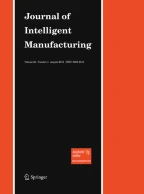Abstract
A holonic manufacturing system (HMS) represents a new breed of intelligent shop-floor management technology for the production of artifacts that satisfy unique customer requirements. Flexibility is an essential characteristic of the HMS in order to manufacture high-variety low-volume artifacts. Autonomous ‘smart’ entities called holons interact, via cooperation protocols, within a HMS to support the runtime reconfiguration demanded by such an agile shop-floor. This paper presents a framework to model and reconfigure, in real-time, the holons' abstract behavioral specifications through the application of Internet-based mobile agents. A tool is also described to convert these specifications into a corresponding implementation model (based on the IEC 61499 function block architecture) that holons can execute across an open network of controller devices.
Similar content being viewed by others
References
Agent communication language from the non-profit Foundation for Intelligent Physical Agents (FIPA) (2000) http://www.fipa.org.
Balasubramanian, S., Brennan, R. W. and Norrie, D. H. (2000) Requirements for holonic manufacturing systems control. International Conference on Database and Expert System Applications (DEXA'2000), London, UK.
Bond, A. and Gasser, L. (1988) An analysis of problems and research in DAI, Chapter 1. Readings in Distributed Artificial Intelligence, Morgan Kaufman.
Bussmann, S. and Sieverding, J. (2000) Specification of holonic agent control concepts in manufacturing logistics: Deliverable D7.3-1 of HMS consortium, DaimlerChrysler, Berlin, Germany.
Chen, Y. and He, Z. (2001) Dependability modeling of the service redirector in the Internet applications. 5th International Symposium on Autonomous Decentralized Systems, IEEE Computer Society.
Christensen, J. H. (ed.) (2001) 61499: Publicly available standard-function block architecture, International Electro-technical Committee.
Consortium (2001) Overview of the International Holonic Manufacturing Systems Programme, http://hms.ifw.uni-hannover.de/
Fletcher, M., Norrie, D. H. and Christensen, J. H. (2001) A Foundation for real-time holonic control systems. Journal of Applied System Sciences (Special issue on Industrial Applications of Holonic and Multi-Agent Systems) 2(1), 22.
Fletcher, M. (2001) On a function block operating system for holonic control. Proceedings of the 12th IASTED International Conference on Modeling, Identification and Control, Innsbruck, Austria.
Georgeff, M. et al. (1999) The belief-desire-intention model of agency. 5th International Workshop on Intelligent Agents, Springer Verlag, Berlin.
Graef, G. and Gaedke, M. (2000) Construction of adaptive web-applications from reusable components. Proceedings of the 1st International Conference on Electronic Commerce and Web Technologies, London, UK.
Huhns, M. N. and Bridgeland, D. M. (1991) Multiagent truth maintenance. IEEE Transactions on Systems, Man and Cybernetics, 21(6).
Jarvis, D. H. and Jarvis, J. H. Design recovery for PLC controlled manufacturing systems. Manufacturing Systems: Modeling, Management and Control, Chapter 4, Elsevier, Amsterdam.
Jennings, N. (1995) Coordination techniques for distributed artificial intelligence. Foundations of Distributed Artificial Intelligence, Chapter 7, John Wiley and Sons, New York.
Koestler, A. (1967) The Ghost in the Machine, Arkana.
Lam, K.-Y., Law, G. and Lee, V. (2000) Priority and deadline assignment to triggered transactions in distributed real-time databases. International Journal of Systems and Software, 51.
Lyons, A. (1998) UML for Real-Time. ObjectTime Ltd., http://www.objectime.com.
Mobile Agents (2000) The International Symposium on Multi-Agents and Mobile Agents in Virtual Organizations and E-commerce, ICSC Press.
Sen, B. et al. (1992) Automating the supplier-manufacturer interface with electronic KANBAN, International Journal of Systems Automation: Research and Applications, 2(3), 305-315.
Sieverding, J. (2000) Specification of manufacturing test missions: Deliverable D7.5-2 of HMS consortium, DaimlerChrysler, Berlin, Germany.
Suda, H. (1989) Future factory system formulated in Japan. Japanese Journal of Advanced Automation Technology, 1.
van Brussel, H. et al, (1998) Reference architecture for holonic manufacturing systems: PROSA. Journal of Computers in Industry (Special issue on intelligent manufacturing), 37(3), 255-276.
Van Dyke Parunak, H., Baker, A. D. and Clark, S. J. (1988) The AARIA agent architecture: from manufacturing requirements to agent-based system design. Proceedings of the ICAA'98 Workshop on Agent-Based Manufacturing, Minneapolis, USA.
Xu, H. and Shatz, S. M. (2001) An agent-based petri net model with application to buyer/seller design in electronic commerce. Proceedings of the 5th IEEE International Symposium on Autonomous Decentralized Systems, Dallas, USA.
Zhang, X., Balasubramanian, S., Brennan, R. W. and Norrie, D. H. Design and implementation of a real-time holonic control system for manufacturing. Journal of Information Sciences, 127(1–2), 23-44.
Zhou, B., Wang, L. and Norrie, D. H. (1999) Design of distributed real-time control agents for intelligent manufacturing systems. International Conference on Intelligent Manufacturing Systems, Leuven, Belgium.
Author information
Authors and Affiliations
Rights and permissions
About this article
Cite this article
Fletcher, M., Brennan, R.W. & Norrie, D.H. Modeling and reconfiguring intelligent holonic manufacturing systems with Internet-based mobile agents. Journal of Intelligent Manufacturing 14, 7–23 (2003). https://doi.org/10.1023/A:1022283111797
Issue Date:
DOI: https://doi.org/10.1023/A:1022283111797
